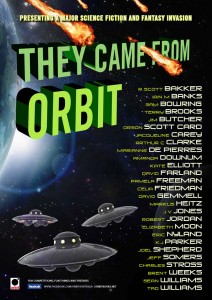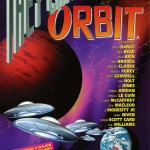The first dizzy glimpses of Tron are unveiled, authors relate the values of peanut butter confectionery to writing, and Angelina sticks to her script. It's a successful first day at Comic-Con
In pictures: the sights of Comic-Con 2010
So there we all were, on our first full day at Comic-Con, packed into the black-curtained, dimly-lit, 6,500-capacity Hall H, which is like outer space only bigger and, less generous observers might say, further from sentient life. We had queued. Oh, how we had queued. And that was just to cross the road (I'm not exaggerating). It was the promise of exclusive footage from Tron: Legacy that had drawn us to Hall H. Never mind easing fans in gently, this was like kicking off a meal with a knickerbocker toffee fudge longboat. Surely everything that followed would resemble braised cabbage by comparison?
Well, yes and no. The Tron event was entertaining, thanks largely to the panel's moderator, the US comic Patton Oswalt. "Is there really something called the Comic-Con Fulfilment Room?" he winced. "I do not wanna go near the carpeting in there." The cast and crew trooped out, including a tanned and silver-maned Jeff Bridges (who is reprising his role from the first Tron, and getting to play opposite his younger self in the sequel), as well as Michael "Tony Blair/Brian Clough/Kenneth Williams etc" Sheen.
I'd already experienced a particular American attitude toward Britishness when, on my first day here, a security guard who was supposed to be giving me directions had indicated instead a group of women I should talk to: "Go on, man, you got that accent, they love that!" Oswalt made a more eloquent fuss over Sheen, telling the audience: "He's British, he's adorable, he flew here in a magic teapot, he's sleeping under a giant dandelion leaf in the city." Sheen did nothing to dispel this impression of one nation united in whimsy. Thanks to him, a sizable wedge of the west coast now thinks we all say "bejinkies" (as in: "Bejinkies, there's a lot of you here today").
So how's Tron: Legacy looking? Shaky – but then I wasn't handed any 3-D glasses on the way in, so I watched the entire eight-minute sequence (in which impressively cheekboned heart-throb Garrett Hedlund is zapped into a world of life-or-death computer gaming) as if through the haze of a light concussion. I could see enough to know it's snazzy; and the director, Joe Kosinski, announced that Daft Punk has composed the soundtrack, which is music to these ears.
The big news revealed during the presentation had nothing to do with Tron. First we were treated to a specially recorded clip from Johnny Depp as Captain Jack Sparrow, on the set of Pirates of the Caribbean: On Stranger Tides, in which he promised "zombies, cut-throats, mermaids and the vicious and vivacious Penelope Cruz", and ended by calling for "Bloody Marys all round". When the next announcement referred to a new film of The Haunted Mansion, the ecstatic crowd reaction cooled, at least until the director involved was revealed to be fantasy cinema demi-god Guillermo del Toro (Pan's Labyrinth), who popped up on stage to promise a live-action, 3D, Eddie Murphy-free take on the movie. "It'll be scary fun," he said. "But the scary part will be scary."
It was a hard act to follow for the next presentation, even with the participation of Angelina Jolie. In the new wham-bam thriller Salt, she plays a CIA agent accused of spying, whereas on stage she suggested instead a superstar who could be accused of sleepwalking. She trotted out by-the-book answers, while her co-star, Liev Schreiber, entered into the cheeky spirit of Comic-Con. Quizzed about what determines whether or not he performs his own stunts, he went for deadpan. "There's a lot of factors. How long am I gonna sit with my feet in a bucket of water afterwards? Is anything fast going to come at me? Will my face or head get bumped or banged in any way?"
My afternoon ended with two literature-related panels. In "Twisting Genres", novelists debated the matter of what draws them to combine apparently incompatible genres in their work. The two analogies that cropped up most often involved Reese's Peanut Butter Cups and sexual intercourse, though not at the same time. (What a party that would make.)
Naomi Novik, whose Temeraire series imagines dragons in the Napoleonic era, brought up the confectionery: "For me, it's that unlikely magic – chocolate and peanut butter together? Oh yeah! The Napoleonic era and dragons? Sure! It's about taking familiar elements and making them new." Daryl Gregory (The Devils Alphabet) admitted he finds it hard to stay in genre. "You start with a couple of ideas, then your ideas have sex with one another and strange babies emerge. Don't those babies deserve a book too? They may be unmarketable babies, but so what?"
Britain's China Mieville (Kraken) allowed a light shower to fall on this parade. "Unfortunately, awesome plus awesome doesn't necessarily lead to more awesome," he pointed out, before making himself very unpopular with the audience by casting aspersions on the utter bliss of the Reese's formula. "Above all, genres are marketing categories. Even what's described as literary fiction is a genre; in Britain, it's just the result of a very successful marketing campaign to persuade readers that it's not a genre. But even if you think genre is a marketing idea, that isn't to say it doesn't have its own integrity and protocol. If you set really stupid, rigid rules for yourself, you can rise to the occasion."
Asked whether there were any elements which should never be combined, Keith Thompson, who wrote the Leviathan trilogy, quipped: "The only really bad idea would be a drivers' manual with an unreliable narrator."
Meanwhile, "Writing Queer" assembled writers whose comics had tackled LGBT characters and issues. The wise and wonderful Howard Cruse, author of the seminal gay graphic novel Stuck Rubber Baby, revealed that he came out through his work. "My first gay story was in 1976 but that didn't commit me to being gay. I could've just been a straight liberal." He said the remnants of his Deep South upbringing had fallen away "after a lot of acid trips", but recalled drawing an autobiographical panel which hinted falsely that he had a girlfriend. "Most of us who are gay have those moments in our past when we were teetering back and forth, in and out of the closet." He later laid the memory to rest by redrawing the offending panel with the gender corrected.
Paige Braddock, the author of Jane's World, gave an insight into the primness of syndicated comic strips. "I didn't realise it until I drew a shower scene," she said. "Apparently I showed a little too much frivolity, and it was pulled. Now there's a running joke if there's a glitch with my blog and it doesn't appear online: everyone just assumes I wrote in another shower scene."
 If you love to read, this site run by one of our sponsors is for you!
If you love to read, this site run by one of our sponsors is for you!





